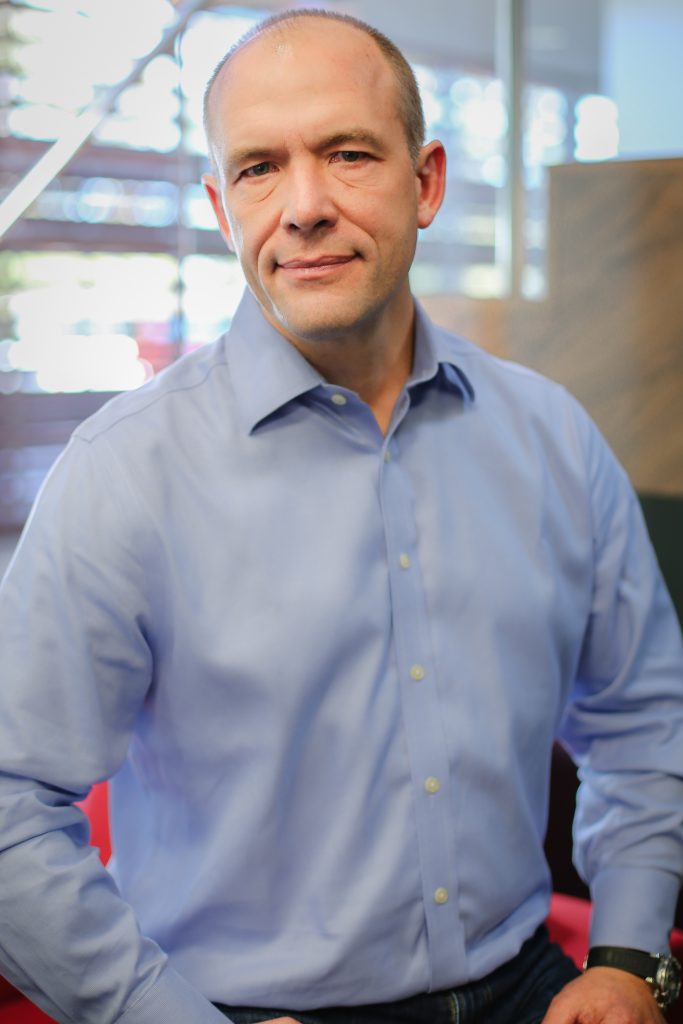By Sophia Bennett

Derick Marsh, CEO of the multinational window covering component manufacturer and distributor Rollease Acmeda, is no stranger to international business. He grew up in Germany, a child of a parent in the U.S. Foreign Service. Intent on making a life in Germany, he earned bachelor’s degrees in international relations and economics at Georgetown University with the goal of working abroad.
Instead, he moved to Chicago after law school at George Washington University and focused on advising foreign companies making investments in the U.S. His final deal was helping a U.K.-based private equity firm acquire what was then Rollease. “Private equity was still a pretty new concept in those days and very exciting to me, so much to the distress of my mother, I stopped being ‘my son the lawyer’ and became something that to this day she cannot really explain to her friends,” he says. He’s been at the helm of Rollease Acmeda since 2005.
Given the company’s size and importance and Marsh’s experience, we asked him to share some insights into where he sees the window covering industry heading. He also offered advice on how heads of companies big and small can lead their teams to success.
What did you do to prepare yourself to take on the role of CEO of a multinational company?
While I had zero experience actually running the day-to-day operations of a manufacturing business, as a corporate lawyer and private equity investor, I saw the inner workings of senior leadership decision-making in hundreds of companies involved in dozens of different markets. I felt I came into the role with strong training in strategic thinking and project management and very quickly picked up incredible direct customer insights to give context to our business initiatives.
The hard part initially was getting my arms around that day-to-day grind that is required to make any business turn. That is where good people come into play. You’ll hear this theme a lot from me: Companies are just empty legal constructs until you fill them with people. You can’t run a company alone, and you can’t be an expert in everything and be everywhere.
What are the most pressing issues facing the window covering industry today?
In 1997, when I first got involved in the industry, the U.S. fabricator landscape was highly fragmented. Fast forward and you now have a relatively small group of dominant fabricators, but two new factors have emerged that are changing the landscape. Retailers are getting bigger and influencing the supply chain more. In addition, private equity or extremely large, well-capitalized companies new to our industry are buying their way in. The traditional “big boys” in our industry all of a sudden look pretty small.
An early impact we are seeing is more vertically integrated businesses, with retail, fabrication, and even component and fabric supply being under one umbrella. This obviously allows for more control over the entire supply and sales chain, which permits greater product differentiation and pricing flexibility. That, together with significant marketing resources, makes it very difficult for single-store specialty retailers to compete. Here’s an example you can take into consideration. These days organizations plunge head-first into ERP solution selection – only to run into problems during implementation. Not that these opportunities like in the form of an Enterprise Resource Planning (ERP) software are ineffective. They need professional support at times. With all the marketing resources pooled, one could be confused as to how to go about everything, or what to focus on.
The U.S. also has a highly developed online retail channel when compared to other countries, and I do not see that segment slowing. COVID accelerated lots of trends, including online shopping and home improvement. It is clear Americans are and will stay comfortable buying window coverings online. Once again, this puts pressure on smaller specialty retailers. It also puts pressure on our core customer base, the fabricator, as online stores and larger retail chains with buying power can exert significant pricing pressure on fabricators.
What do people and companies need to do to adapt to these challenges?
We have to be proactive and embrace these fundamental shifts in our industry in a way that allows us to grow. We cannot altogether avoid the inevitable discussion about price, but if we give our customers differentiated product that allows them to sell that on at a decent margin, we take away the incentive to focus on price.
That means we have to innovate, which requires significant investment. Our most ambitious recent investments revolve around strengthening our expertise and depth in performance fabrics, motorization and automation. We also are developing strategic partnerships in pretty much every part of the supply and sales channel. We can’t be experts in everything, but neither can anyone else. So, we identify like-minded partners that we think will benefit as much or, ideally, even more than we do to put innovative mutual support structures in place that leverage our respective capabilities.
An easy example is our partnership with Rowley Company, which is very adept at quickly fulfilling smaller orders and has a major presence in drapery hardware. Rowley now handles many of our smaller orders so we can still offer MOQs (minimum order quantities) that would otherwise not make business sense for us. We also co-developed a drapery motor and track system that will change the game in this segment, a feat neither of us could have accomplished on our own.
What does it take to be a good leader today, especially in the face of the challenges posed by COVID-19, climate change and other big problems?
What our COVID experience demonstrated very clearly is that leadership is not about one person using brute force to get through a crisis. I don’t care how smart or hardworking you are-you have to start with a strong foundation of people and not skimp on infrastructure and systems. We had severe lockdowns in our Italian and Australian operations, and virtually all office staff has been working from home in the U.S. since March, and yet our business is thriving. That doesn’t happen because I am so great. It happens because, collectively, our managers and people stepped up and showed they had the training and fortitude to work remotely and deliver some of their best work ever.
We spend a lot of time and money thinking about our existing and needed talent and how to develop our leaders. A big part of my role is to make sure that this focus is relentless, that our people are clear on strategic direction and their role in making that strategy happen, and that our structure allows them to perform to their potential. I see so many resource-starved companies in our industry that are much too reliant on a small handful of people. It may save money and ego today, but long-term, it starves the business of growth and profits.
The other critical thing a leader needs to bring to the table is a clear sense of company culture. We boil our basic company behaviors down into four themes: Be action-oriented, customer-oriented, innovative and passionate. If we don’t keep it simple, it gets too hard to remember. We hire people based on these behaviors. Our performance reviews always address these values, and we work hard to move out anyone who can’t get on board with these values or who can’t do it politely and with respect for others.
How do you keep your team motivated despite conflicts and obstacles?
One interesting thing that came out of this pandemic is that you can see pretty clearly what motivates most of your people. Initially, there was a fear factor that was almost paralyzing. Fear of getting sick and fear of losing a job are powerful emotions. If people are scared, they tend not to be productive or motivated for long.
So, the executive team at our company went into overdrive to communicate often and transparently, as most fear is related to not having awareness of what is happening or what is about to happen. We have regular management and all-hands meetings where we share very sensitive profit and cash or liquidity information so everyone hears directly how we are doing. We repeat often where we are headed, short and long term, from a strategy standpoint. We openly share our challenges and any impact that might have on jobs. We try even harder to promote from within to prove that our people can continue to grow in responsibility and financially even during a global pandemic.
Once fear subsided and we moved into a very grinding, high-activity state, we wanted to recognize the contributions from our employees and thank them for their continued effort and support. Just before the holidays, every employee, regardless of hiring date, got a meaningful cash bonus that was multiples higher than anything we had ever done. Given the time of year, it felt like the most appropriate way to recognize their contributions and celebrate a business “win” together.
Derick’s Marsh Recommended Books on Leadership
How to Lead: Wisdom from the World’s Greatest CEOs, Founders, and Game Changers by David M. Rubenstein
No Rules Rules: Netflix and the Culture of Reinvention by Reed Hastings and Erin Meyer
Primal Leadership: Realizing the Power of Emotional Intelligence by Daniel Goleman, Richard Boyatzis and Annie McKee
The Ride of a Lifetime: Lessons Learned from 15 Years as CEO of the Walt Disney Company by Robert Iger
What It Takes: Lessons in the Pursuit of Excellence by Stephen A. Schwarzman
Powerful: Building a Culture of Freedom and Responsibility by Patty McCord
The Five Dysfunctions of a Team: A Leadership Fable by Patrick Lencioni
Principles: Life and Work by Ray Dalio
Shoe Dog: A Memoir by the Creator of Nike by Phil Knight
The Third Wave: An Entrepreneur’s Vision of the Future by Steve Case
Scaling Up: How a Few Companies Make It…and Why the Rest Don’t by Verne Harnish
Start with Why: How Great Leaders Inspire Everyone to Take Action by Simon Sinek





